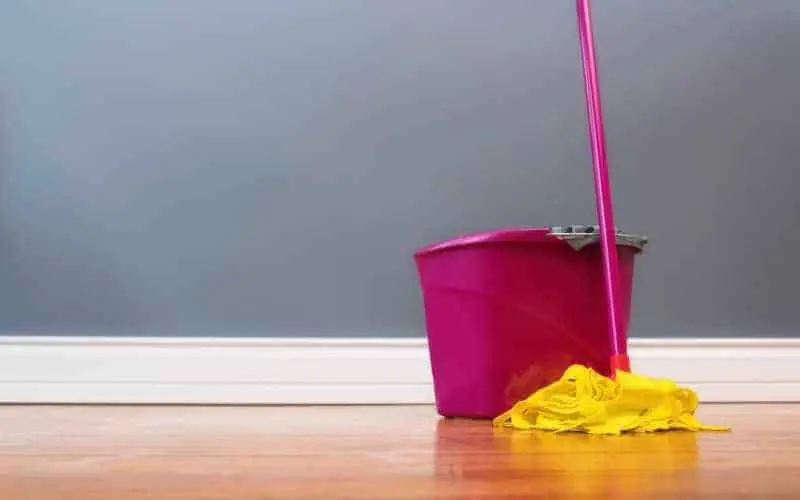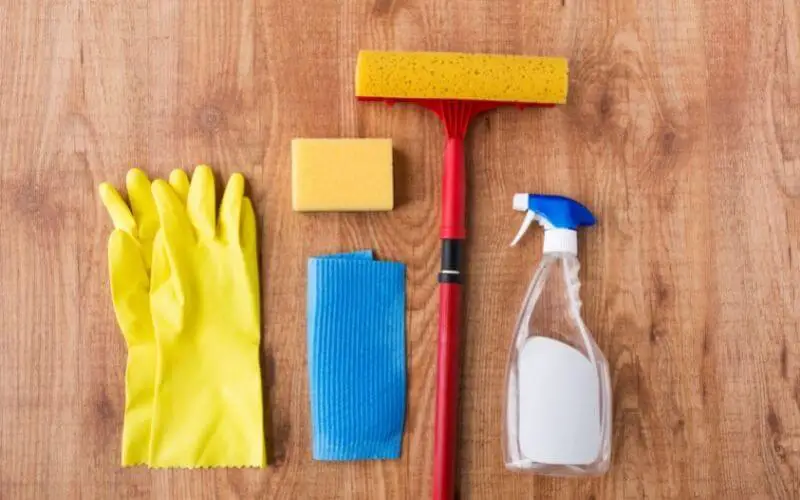Caring for laminate floors is quite easy. However, given the fact that there are so many care instructions on how to care for laminate floors on the internet, sometimes you can get a bit confused.
An important question might pop up every now and then; will rubbing alcohol damage laminate flooring? Yes! Rubbing alcohol can damage your laminate floors. While rubbing alcohol is usually recommended for cleaning laminate floors, too much of it can damage your floors.
Read on as we more explore more about this.
Will Rubbing Alcohol Damage Laminate Flooring?
Table of Contents
As already stated, rubbing alcohol can damage laminate floors. But we need to give this answer some context.
Without a doubt, alcohol is also an excellent cleaning agent, whether it’s rubbing alcohol, denatured alcohol or even gin or pure vodka.
Alcohol has a virtually neutral pH, which means it is neither acidic nor alkaline. As a result, alcohol is an excellent element for making DIY cleaners that clean, protect and preserve laminate floors.
However, while rubbing alcohol is a good cleaning agent for laminate flooring, it is still possible for rubbing alcohol to damage laminate floors.
When alcohol is used as a cleaning agent for laminate floors, it is usually diluted with a copious amount of water. In contact with the laminate floors, the alcohol acts as a solvent, dissolving the coatings.
How to Maintaining Laminate Floorings
Cleaning laminate flooring is straightforward if you use the right tools and methods. Tough stains and markings can be removed without the use of harsh chemicals. Here are a few things you should avoid:
1. Make Use of Abrasive Equipment Sparingly
Never use steel wool or hard brushes on laminate floors, as this will leave scratches on the protective layer and may cause it to deteriorate.
2. Avoid Using Waxes and Polishes
When you use polishes or waxes on laminate flooring, it becomes slippery and leaves a filmy residue. It has the ability to dull the finish and accumulate dirt and dust as well.
3. Never Use Ammonia
Although ammonia is an efficient stain remover, it should be kept away from your laminate floors. Over time, the powerful chemical can peel the top layer from the boards.
4. Don’t use Steams on Laminate Floors
Avoid using steam cleaners or even mops on laminate floors. While steam cleaning is effective on grout, it is harmful on laminate floors. Moisture may enter the seam and cause interior damage to the boards.
5. Don’t Sand or Refinish
While laminate may appear to be similar to hardwood, it is not the same. While hardwood floors can be sanded to restore or repair the surface, laminate cannot. You will remove the top layer and leave marks that will not be healed if you sand it.
6. Make use of Doormats and Rugs
Use a few throw rugs or doormats to protect the floor from scuff marks and damage. Doormats will also keep dirt out of the house and serve as a friendly reminder for guests to take off their shoes.
7. Trim Your Pet’s Nails
Although laminate does not scratch as easily as hardwood, it is possible. Keep your dog’s nails short to avoid scratching if you have a lively puppy.
Read: How to keep pets from scratching floor
How do you Remove Rubbing Alcohol from Laminate Flooring?
Follow the step to remove rubbing alcohol from laminate floors.
Step 1: Using clean paper towels or white cloths, blot up as much rubbing alcohol as possible. If the stain is fresh, blotting should remove a lot of the alcohol from the floor.
Step 2: Dampen a clean white cloth or paper towels with warm water and wipe the stain. Some of the alcohol may dissolve in the water, making it easier to wipe up. Blot away any excess water or alcohol as you go.
Step 3: Soak a clean white cloth in mineral spirits and dab it on the stain to remove it. Wait for two to three minutes for the spirits to work on the stain before blotting it with a clean white towel.
Step 4: If the stain is still there, clean the floor using a vinyl floor cleaner. If you are confused about which cleaner is suitable for your floors, contact the manufacturer. Cleaning should be done following the product recommendations.
Step 5: Rinse the freshly cleaned area with clean, cool water and carefully dry it to eliminate residue cleanser and alcohol.
Conclusion
Maintaining and cleaning laminate flooring is straightforward when the necessary precautions are taken.
The wood-like surface eliminates the need for harsh cleaning agents or chemicals. A simple vinegar and water solution – even warm water – would suffice.
Back to the question, will rubbing alcohol damage laminate flooring? We are certain you have the answer to that question.


